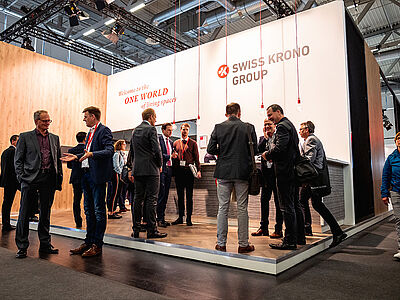Terms and Conditions of Sale and Delivery
1. Scope of application
1.1
These Terms and Conditions of Sale and Delivery apply to all sale and delivery transactions of SWISS KRONO TEX GmbH & Co. KG (hereinafter referred to as the "Seller").
1.2
Only these Terms and Conditions of Sale and Delivery shall apply. Terms and conditions of business of the Buyer or amendments to these Terms and Conditions of Sale and Delivery shall not become an integral part of the agreement, even if they are not objected to by the Seller.
1.3
These Terms and Conditions of Sale and Delivery shall also apply to all future sale and delivery transactions between the Parties.
1.4
These Terms and Conditions of Sale and Delivery shall only apply vis-à-vis persons who, in respect of the contractual relationship, are exercising their commercial or self-employed activity (hereinafter referred to as “Entrepreneurs”) or are public-law legal entities or public-law funds.
2. Conclusion of the agreement and rescission
2.1
An agreement shall be deemed to have been entered into when the Parties agree on all key contractual components, in particular on the price, and the Seller has confirmed the conclusion of the agreement by accepting an offer made by the Buyer in writing. The intended use of the goods that may have been communicated by the Buyer shall not form part of the commercial basis of the agreement. Assessing the suitability of the goods for the Buyer's intended use, where appropriate consulting specialists, such as structural engineers and architects in particular, shall be the responsibility of the Buyer alone.
2.2
Verbal offers and agreements made prior to the conclusion of the agreement shall have no binding effect on the Seller. Written offers made by the Seller shall only have a binding effect on the Seller (in particular regarding prices, delivery times, drawings, images, dimensions, weights or other technical data) insofar as this information is explicitly set out in the offer.
2.3
The Buyer is bound by any offers made vis-à-vis the Seller or the latter's representative for two weeks from the time of their receipt where the offers do not contain any longer commitment period.
2.4
No offer, contractual and project documents may be reproduced or made available to third parties without the consent of the Seller. They shall be returned immediately at the request of the Seller, who is entitled to make such a request at any time.
2.5
The Seller is entitled to rescind the agreement if the Buyer – despite being granted a grace period (if necessary) – fails to provide the cooperation necessary for the Seller to perform. This shall also apply if the manufacture of, or compliance with, custom-made products, required qualities and agreed deadlines is no longer possible due to such obstacles to performance for which the Seller is not responsible, which were not foreseeable for the Seller at the time the agreement was concluded and which cannot be overcome within the contractual performance period.
2.6
If the Parties have agreed on advance payment and payment of the agreed price has not been made/secured (e.g. through commercial credit insurance, bank guarantee, advance payment) by the agreed payment date, the Seller is entitled to refuse to perform any service that it is still obliged to perform until payment has been made or secured. Alternatively, the Seller can declare the rescission of the agreement in accordance with the statutory provisions.
2.7
If the Seller rescinds the agreement pursuant to section 2.5, the Buyer cannot derive any further rights vis-à-vis the Seller – with the exception of the request for repayment of payments made for this agreement.
3. Price and payment
3.1
The agreed price is exclusive of valid statutory VAT in each case. Unless the Parties have agreed otherwise, the Buyer shall pay in advance. If there are statutory provisions governing exemption from VAT, the corresponding requirements must have been met with a direct temporal link to the delivery. Tax-free EU deliveries: the Seller is obliged to prove, furnishing corresponding evidence, that the delivered goods have actually left Germany and reached another EU member state (known as a "confirmation of arrival"). The Seller shall provide the Buyer with the confirmation of arrival by e-mail. In this respect, the Seller requires the Buyer to issue a declaration of consent to the electronic receipt of the confirmation of arrival (self-collector). The confirmation replay by e-mail can only be sent by the Buyer after the goods have actually arrived in another EU member state. The Buyer shall reimburse the consequential costs incurred by the Seller due to the lack of the abovementioned documentary evidence, e.g. subsequent VAT charges and other damage incurred. In all other respects, the agreed price applies ex delivery works; the Buyer shall be responsible for the dispatch of the goods and it shall bear the costs of insurance, freight, customs duties, import duties and other import charges.
3.2
Insofar as amendments are agreed at the Buyer's request after the agreement has been entered into, the Buyer is obliged to compensate the Seller for any additional expense incurred. If the price for the additional expense is not agreed when the agreement is amended, it shall be calculated by the Seller at the latter’s due discretion taking into account the agreement price level on the basis of the Seller's original calculation.
3.3
If, between the point in time at which the agreement is concluded and the time of delivery, there is an increase in the prices of raw materials and supplies, salaries or other economic conditions that are relevant to the price (e.g. exchange rate fluctuations), the Seller is entitled to adjust the price accordingly at its own due discretion (section 315 (1) of the German Civil Code (BGB)).
3.4
Where payment in advance has not been agreed, payments shall fall due 7 calendar days after the invoice has been issued with a 2% discount and 30 calendar days after the invoice has been issued subject to no deductions. Payments are to be made exclusively in EUROS.
3.5
If possible, the Seller will deliver everything in one consignment. Partial deliveries may, however, be made and can be invoiced separately. The additional costs incurred for the partial delivery shall be borne by the Seller.
3.6
If the Buyer defaults on payment, it shall owe default interest at a rate that is 9 percentage points above the base interest rate and a lump sum in the amount of €40. Further default claims of the Seller shall remain unaffected, although the lump sum shall be credited insofar as the loss results from costs of legal proceedings. In the event that the Buyer defaults on payment, the Seller is entitled to suspend further deliveries to the Buyer, even if these do not belong to the same sale and delivery transaction.
3.7
Payments shall be made by way of bank transfer.
3.8
If the Buyer and Seller have not expressly agreed otherwise, the Seller shall use the same means of payment and the same transfer method for the repayment of overpayments made by the Buyer as for the original transaction. This also expressly refers to the account or bank details originally used for the transaction.
3.9
In derogation of the Buyer’s terms of payment, the Seller may offset the following against payments made by the Buyer: litigation costs, interest, principal claim. These offsets may result in an increase in the interest due. The Buyer must be notified of the offset within one month of receipt of payment; otherwise, the Buyer’s terms of payment shall apply.
3.10
If the Buyer has receivables from the Seller (counter-claims), the Buyer is only entitled to offset amounts, withhold sums or reduce payments if the counter-claims have been established in a final and non-appealable judgment, are undisputed or result from the same agreement under which the delivery in question was made.
3.11
Claims of the Buyer against the Seller may only be assigned with the written consent of the Seller. This shall not apply to monetary claims.
4. Goods delivery
4.1
If the Parties have agreed on advance payment, the Seller shall be obliged to deliver the ordered goods at the earliest when payment of the agreed price within the meaning of section 2.6 has been secured.
4.2
The Buyer shall accept the goods on the Seller’s premises immediately after receiving notification that the goods are ready for collection. If the goods are not accepted within two weeks at the most, the goods are deemed to have been accepted and can be publicly stored at the Buyer’s expense. The Buyer shall reimburse the Seller for any costs incurred as a result of the delay in accepting the goods; this shall not affect any further-reaching consequences of the delay in acceptance.
4.3
The Seller is entitled to manufacture the goods differently to comply with statutory provisions, provided that this does not result in a deterioration of their quality or suitability for use.
4.4
Deliveries shall be made subject to timely delivery to the Seller itself. If, over and above this, events that constitute force majeure (such as interruptions of operations, strikes, measures taken by sovereign authorities, transport disruptions, fire, natural disasters, epidemics) prevent agreed delivery deadlines from being met, then the deadlines shall be extended accordingly without giving rise to any resulting claims on the part of the Buyer. The same applies if the Buyer fails to meet existing cooperation obligations, for example submitting all planning documents, approved for the preparation of the work, that are required for production of the goods.
4.5
If the Seller defaults on the delivery, the Buyer's claims are limited to an amount corresponding to 0.5% of the value of the goods affected by the delay per week of delay, but shall not exceed 5% of the value of the goods affected by the delay in total. Any further-reaching claims of the Buyer shall only arise in the event of wilful intent, gross negligence or a breach of a cardinal obligation on the part of the Seller (cf. section 6.7).
4.6
Section 4.5 shall not apply in the case of a commercial transaction with a fixed date; in such cases, section 376 of the German Commercial Code (HGB) shall apply.
5. Transfer of risk
5.1
The risk of accidental loss or deterioration of the goods shall pass to the Buyer upon notification that the goods are ready to be shipped or collected, and at the latest upon actual or assumed acceptance of the goods pursuant to section 4.2 sentence 2.
5.2
If dispatch to the Buyer has been agreed (irrespective of who is to bear the costs), the risk shall pass to the Buyer as soon as the Seller has handed the goods over to the carrier.
6. Warranty
6.1
The Seller’s goods consist predominantly of wood, a natural material. Wood exhibits a range of natural differences in colour, structure and other attributes, meaning that such differences do not constitute defects. Minor deviations from a product’s description, especially the deviations listed in the quality guidelines and, in the case of boards with fixed dimensions, dimensional deviations of up to 10%, shall not constitute defects, also in cases other than those set out in section 4.3. This applies accordingly if the cost of eliminating defects does not exceed 4% of the value of the goods that form part of the sale and delivery transaction.
6.2
In the case of melamine resin-coated products to be used outside Europe, the Seller shall only be liable for defects if the intended use and location of use are communicated to the Seller in writing and the Seller confirms the suitability of the materials in writing.
6.3
Claims based on defects may only be made if the Buyer makes the defective goods available to the Seller for inspection. Return shipments must be agreed by the Parties in advance.
6.4
Unless expressly agreed otherwise, the Seller does not warrant the suitability of the goods for the Buyer's intended use.
6.5
Following the transfer of risk pursuant to section 5, the Buyer is obliged to inspect the goods for defects, including the delivery of the wrong products or quantities, without delay and raise any objections in writing immediately. This shall apply even if goods samples have been supplied in advance. If defects only become apparent at a later date, they also have to be objected to. If the Buyer fails to give notice of defects, the goods shall be deemed to have been approved and there shall be no claims for defects against the Seller, irrespective of the legal grounds.
6.6
In the event of defects, the Buyer's claim is limited, in the first instance, to subsequent performance by way of the rectification of defects; instead, the Seller can opt to provide subsequent performance by way of the delivery of replacement goods if it so chooses. It is only if the subsequent performance fails or if the Seller refuses to provide it that the Buyer shall have a right to reduce the price or a right of withdrawal, as it chooses.
6.7
The Seller shall be liable for physical loss or damage and purely financial losses in cases involving wilful intent, gross negligence or ordinary negligence in breaches of cardinal obligations in accordance with the statutory provisions. Liability for ordinary negligence in breaches of cardinal obligations shall be limited to the damage that is typical given the nature of the agreement and was foreseeable at the time the agreement was concluded. Cardinal obligations are obligations that grant the Buyer a legal position that has to be granted to the Buyer based on the content and purpose of the agreement, as well as obligations whose fulfilment is a prerequisite for enabling the proper fulfilment of the agreement in the first place and in which the Buyer (may) normally trust(s).
6.8
The restriction pursuant to section 6.7 shall not apply in the event of injury to life, limb or health for which the Seller is responsible, or to claims under the German Product Liability Act (Produkthaftungsgesetz). The limitation of liability shall apply accordingly to damage resulting from third-party claims against the Buyer.
6.9
In cases involving defects of title in connection with patent rights, the Seller shall only be liable in the event of wilful intent or gross negligence.
6.10
Claims based on defects on the part of the Buyer against the Seller shall become statute-barred after one year. This does not apply to goods pursuant to section 438 (1) no. 2 BGB. Instead, the statutory limitation periods shall apply to claims for damages asserted by the Buyer due to damage to life, limb or health culpably caused by the Seller or its vicarious agents, as well as for other damage caused by gross negligence and wilful intent. The limitation period shall commence with the transfer of risk in accordance with section 5.
6.11
The Buyer shall only have claims of recourse against the Seller based on the provisions governing the purchase of consumer goods to the extent that the Buyer has not established any claims that exceed the statutory claims based on defects with its contractual partner in the supply chain. Claims of recourse of the Buyer shall become statute-barred after one year; section 445b (2) BGB shall not apply. Sections 6.7 and 6.9. shall apply accordingly. Terms of payment, rebates, discounts, the assumption of transportation services and comparable services granted to the Buyer shall be deemed equivalent compensation pursuant to section 478 (2) sentence 1 BGB. The Buyer is obliged to notify the Seller immediately of any case of recourse occurring in the supply chain.
6.12
The warranty obligation for defects shall lapse if the goods are altered, processed or improperly treated.
6.13
If, after the Buyer has brought a warranty claim against the Seller, it emerges that the Seller has no such warranty obligation, the Buyer shall reimburse the Seller for any expenses incurred.
7. Reservation of title
7.1
The delivered goods shall remain the property of the Seller until the Buyer has fulfilled all obligations towards the Seller in connection with the sale and delivery transaction. The inclusion of individual claims in a running bill or a balancing of accounts and their acknowledgement by the Seller shall not affect this retention of title.
7.2
The delivered goods shall remain the property of the Seller until the full satisfaction of all claims that the Seller has against the Buyer, irrespective of the legal grounds for such claims, either now or in the future. Section 7.1 sentence 2 shall apply accordingly.
7.3
The Buyer is entitled to combine, mix and process goods subject to the reservation of title in the regular course of business, namely for the Seller as the manufacturer but without any obligations towards the Seller. If the Seller's ownership of the delivered goods lapses as a result of combining, mixing or processing, then co-ownership of the resulting new object shall already be passed from the Buyer to the Seller based on the ratio of the value of the delivered goods to the Buyer’s object at the time of combining, mixing or processing.
7.4
The Buyer shall bear the risk for the goods subject to the reservation of title. It must carefully store the goods, mark them as the property of the Seller, store them separately and insure them against loss, theft, fire, etc. It hereby assigns any claims against the insurance company in the event of a loss to the Seller, who accepts them. In the event that the Seller’s rights are attached or otherwise impaired by third parties, the Buyer must inform the third party of the Seller’s rights and immediately advise the Seller in writing. Costs incurred due to the attachment or other impairment of the Seller’s rights or due to the failure to provide notification of the Seller’s rights (including the costs of litigation) and damages shall be borne by the Buyer.
7.5
The Buyer is entitled to sell the goods subject to the reservation of title or the new object in the regular course of business. This excludes attaching or pledging as security. The Buyer already assigns any receivables resulting from such a sale to the Seller, who shall accept them. The Buyer is obliged to keep the proceeds accruing to the Seller separate from its own assets and those of third parties and to document this by way of corresponding entries in its books or invoices. If the Buyer’s receivables resulting from the sale to a third party are credited to a current account, then the Buyer must object to this, referring to the Seller’s rights, and immediately inform the Seller in writing. The Seller authorises the Buyer to collect the assigned receivables in its own name; this authorisation is revocable in the event that the Buyer defaults on the fulfilment of obligations vis-à-vis the Seller.
7.6
If the value of the aforementioned securities exceeds 20% of the Seller’s receivables in the long term, then the Seller may approve these at its discretion.
7.7
The Buyer must do everything in its power to ensure the full validity of the aforementioned agreed retention of title, also under the law of the country to which the goods are delivered or based on the Buyer's registered office, and in particular to make all necessary legally binding declarations vis-à-vis the Seller or third parties.
8. Release from liability for goods based on the Buyer's specifications
8.1
For goods manufactured based on its specifications, the Buyer is solely liable as a co-producer in the inter partes relationship under the German Product Liability Act. It indemnifies the Seller against third-party claims in this regard.
8.2
If the Buyer has specified how the Seller is to manufacture the goods and these specifications result in a violation of patent, copyright, trademark or other proprietary rights of third parties, then the Buyer shall indemnify the Seller against third-party claims.
9. Miscellaneous
9.1
This Agreement shall be governed by autonomous German law. The application of the UN Convention on the International Sale of Goods (CISG) is excluded.
9.2
If the Buyer is a merchant, a legal entity under public law or a fund under public law, Neuruppin shall be the exclusive place of jurisdiction for all disputes arising from, or in connection with, this agreement.
9.3
The place of performance for all obligations relating to the contractual relationship is Heiligengrabe near Wittstock.
9.4
If individual provisions of the contractual relationship be or become null and void or invalid, this shall not affect the validity of the other provisions. The Parties are obliged to agree on a new provision that most closely approximates the purpose pursued with the null and void or invalid provision.
9.5
No verbal collateral agreements have been reached regarding the contractual relationship. All amendments must be made in writing; transmission of the written declaration by fax shall suffice. This shall also apply to any amendment to the provision governing written form itself. The requirement regarding written form also applies to declarations with the ability to alter a legal relationship (Gestaltungswirkung), in particular withdrawal, and to the setting of deadlines.
Heiligengrabe, February 2024





